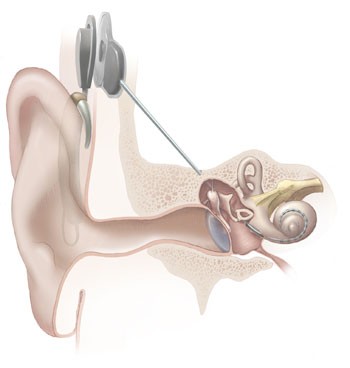Gene Therapy Boosts 'Bionic Ear' Hearing

Animal testing has revealed that gene therapy may one day be used to help people with cochlear implants hear more clearly, according to a recent study.
The study, published in Science Translational Medicine, details how the hearing of deaf guinea pigs with cochlear implants was improved after special cochlear devices were implanted in the guinea pigs that encouraged the growth of new nerve fibers.
A standard cochlear implant is surgically embedded into the cochlea -- the auditory potion of the inner ear -- and sends signals interpreted from noise directly into cochlear nerve fibers. Normally, these fibers are very sensitive and are stimulated by sensory cells called "hair cells," but in the case of people with poor hearing, these hair cells are damaged or limited, and the cochlear implant with its limited range of signaling has to take their place. As the ear degrades further, it become harder and harder for standard implants to send signals into the nerve fiber, as the fiber itself begins to degrade a retract into the inner-ear.
However, according to the study, researchers have developed a cochlear implant which uses electrode enabled genetic stimulus to encourage nerve fiber growth, repairing or at least mantaining the remaining fiber of a degrading ear.
The authors of the study explained that in best cases among the guinea pig implants, electrodes from the special designed cochlear implant arrays stimulated new nerve fiber growth that strengthened the relationship and even sensitivity between the inner ear and the implant.
Of course, this technology is still too new to be tested in humans just yet, as the long-term impacts of the devices must still be considered. However, researchers behind the study explain that it is their hope to one day have "bionic" ears so closely tied into the nervous system that even hearing complex sounds like music will become a reality.
The study was published in Science Translational Medicine on April 23.
Apr 23, 2014 06:15 PM EDT




